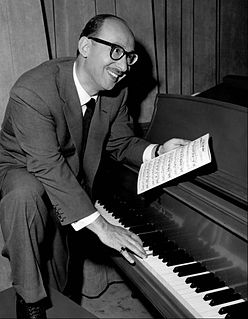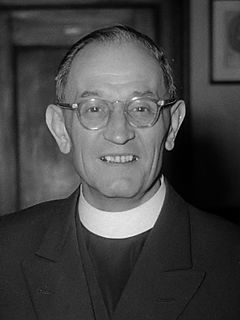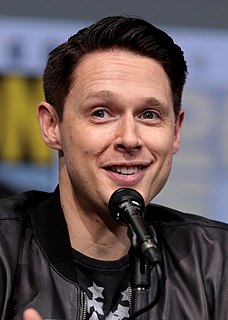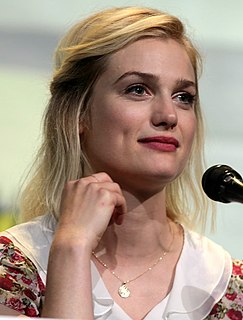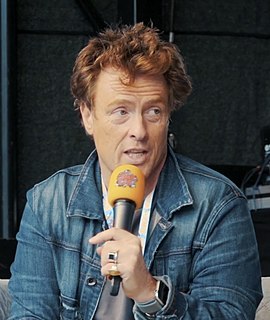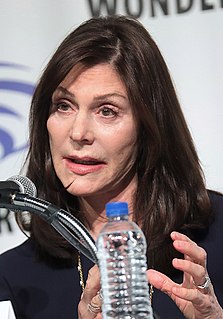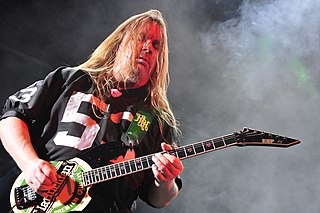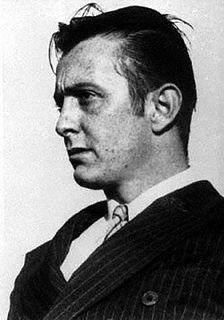A Quote by Alden Ehrenreich
It was pretty fun [auditioning on the Millennium Falcon], because I enjoyed the material a lot. Last year I read for the directors, then came to England and did a test on the Falcon, then came back and did a couple more screen tests in Los Angeles.
Related Quotes
I did a lot of musicals when I was younger. And then I went to Northwestern University, and I did more musicals. I went on to do more work in Chicago, and then while I was in college, I got flown out to Los Angeles to do a screen test for 'Back to the Future.' When I got to Los Angeles, I was like, 'Hmmm, this is different.'
I had an audition process that went on for a long time, and I got to spend a lot of time with the guys who are directing the film. Getting to be around them and being around the world a little bit has been the main experience so far. I did my audition on the Millennium Falcon for one of my screen tests, which was pretty cool.
I'll remember this to my grave. We all walked into a room to see the screen tests. The first screen test was Marion Hutton's. Then came Janis Paige [who ended up with a part in the film]. Then on the screen came Doris Day. I can only tell you, the screen just exploded. There was absolutely no question. A great star was born and the rest is history.
First they arrested the Communists - but I was not a Communist, so I did nothing. Then they came for the Social Democrats - but was not a Social Democrat, so I did nothing. Then they arrested the trade unionists - and I did nothing because I was not one. And then they came for the Jews and then the Catholics, but I was neither a Jew nor a Catholic and I did nothing. At last they came and arrested me - and there was no one left to do anything about it.
I'm a Brit and I just put myself on tape, back in London, for a very distant American project that I thought I didn't stand a chance of getting. And then, I got a call about a week after I had submitted my tape, just saying, "They really like you and want to screen test you." So, I flew to L.A. and did the screen test. And then, I met Elijah [Wood] and did a screen test with him. And then, I had a very nerve-wracking few days back home, waiting and waiting and thinking, "This cannot possibly go my way because that would just be too good to be true." And then, it did.
I guess I did a couple of things when I was a kid, but they weren't really acting - I think I walked down a corridor or something. Then I didn't want to do it at all. I got into it because both my parents were actors and so I went with the flow. Then I said, "I can't handle this, I don't like auditioning." I still hate auditioning, but it's less painful then it was back then.
First they came for the Jews, but I did nothing because I'm not a Jew. Then they came for the socialists, but I did nothing because I'm not a socialist. Then they came for the Catholics, but I did nothing because I'm not a Catholic. Finally, they came for me, but by then there was no one left to help me.
Many years later, after Niemöller had been imprisoned for eight years in concentration camps as the personal prisoner of Adolf Hitler, he penned these infamous words: First they came for the Socialists, and I did not speak out - because I was not a Socialist. Then they came for the Trade Unionist, and I did not speak out - because I was not a Trade Unionist. Then they came for the Jews, and I did not speak out - because I was not a Jew. And then they came for me - and there was no one left to speak for me.
The requests started coming in from other prisoners all over the United States. And then the word got around. So I always wanted to record that, you know, to record a show because of the reaction I got. It was far and above anything I had ever had in my life, the complete explosion of noise and reaction that they gave me with every song. So then I came back the next year and played the prison again, the New Year's Day show, came back again a third year and did the show.
I did tons of theater in school, and then when I was 16 and got my driver's license, I started driving to Los Angeles, along with my friend Eric Stoltz, who was a year ahead of me and was doing the same thing. So we had the same manager, and we started auditioning for things and doing commercials when we were 16.


